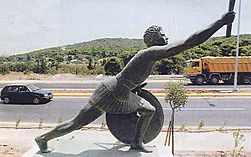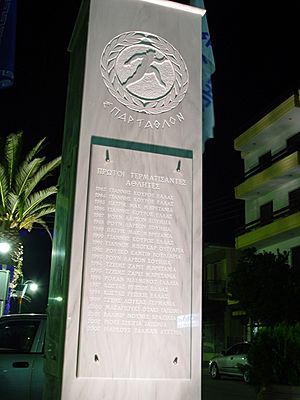Pheidippides facts for kids
Quick facts for kids
Pheidippides
|
|
|---|---|

Statue of Pheidippides alongside the Marathon Road.
|
|
| Born | c. 530 BCE |
| Died | c. 490 BCE |
Pheidippides (pronounced Fee-dip-pee-deez) or Philippides (pronounced Fil-lip-pee-deez) was a famous ancient Greek runner. He is known for a story that inspired the modern marathon race. This story says he ran from Marathon to Athens to share news of a big victory.
Contents
The Story of Pheidippides
The most famous story about Pheidippides says he was an Athenian messenger, also called a hemerodrome (which means "day-runner"). He was sent to Sparta to ask for help when the Persians landed at Marathon. He ran about 240 kilometers (150 miles) in just two days! Then, he ran back to Athens.
After the Greeks won the Battle of Marathon in 490 BCE, the story says Pheidippides ran about 40 kilometers (25 miles) from the battlefield near Marathon all the way to Athens. He wanted to announce the Greek victory over Persia. When he arrived, he supposedly shouted, "Joy to you, we've won!" and then collapsed and died.
Where Did the Story Come From?
Many people think this story comes from the ancient Greek historian Herodotus. He wrote about the Persian Wars around 440 BCE. However, Herodotus actually did not mention a runner going from Marathon to Athens to announce the victory. Experts believe the story of the dying messenger is likely a "romantic invention" that became popular much later.
The first known written account of a messenger running from Marathon to Athens to announce victory appeared much later, in the 2nd century CE. A writer named Lucian mentioned a messenger named Philippides who used the word "joy" as a greeting after bringing news of the victory.
Pheidippides in Herodotus's Account
Herodotus did write about Pheidippides, but his story is different. According to Herodotus, Pheidippides was a professional long-distance runner. The Athenian generals sent him to Sparta to ask for help before the Battle of Marathon.
On his way to Sparta, Pheidippides claimed he met the god Pan on Mount Parthenium. Pan supposedly asked why the Athenians didn't pay attention to him, even though he had helped them before and would help them again. The Athenians believed Pheidippides. Later, they built a shrine to Pan and held yearly ceremonies to thank him.
Pheidippides reached Sparta the day after leaving Athens. He delivered the message asking for help. The Spartans wanted to help, but they had a law that prevented them from going to war until the moon was full. So, they waited, and the Battle of Marathon happened without them.
This story about Pan is important because people believed Pan could cause a sudden, irrational fear that made people panic. This idea of "panic" was linked to Pan helping the Athenians against the Persians at Marathon.
The Marathon Race Connection
The story of Pheidippides running from Marathon to Athens inspired the creation of the modern marathon race. Robert Browning wrote a poem called Pheidippides in 1879, which helped make the story famous.
The word "marathon" itself comes from the Greek word for "fennel," a plant that grew in the area of the battlefield.
Baron Pierre de Coubertin and others who started the modern Olympic Games were inspired by this story. They created a running race of about 40 kilometers (25 miles) and called it the marathon. In 1921, the official length of marathons became standardized at 42.195 kilometers (26 miles, 385 yards).
Modern Times
The Spartathlon Race
In 1982, a British RAF officer named John Foden and some others wondered if Pheidippides's run to Sparta (as described by Herodotus) was even possible. They traveled to Greece to test if someone could run nearly 250 kilometers (155 miles) in a day and a half. Three runners successfully completed the distance.
Since 1983, an annual footrace called the Spartathlon has been held. This race goes from Athens to Sparta, covering 246 kilometers (153 miles) of Greek countryside. It celebrates Pheidippides's amazing run to Sparta.
- Course records
- Male: 20 hours, 25 minutes, 0 seconds, Yiannis Kouros (Greece), 1984
- Female: 24 hours, 48 minutes, 18 seconds, Patrycja Bereznowska (Poland), 2017
See also
 In Spanish: Filípides para niños
In Spanish: Filípides para niños
 | Sharif Bey |
 | Hale Woodruff |
 | Richmond Barthé |
 | Purvis Young |


